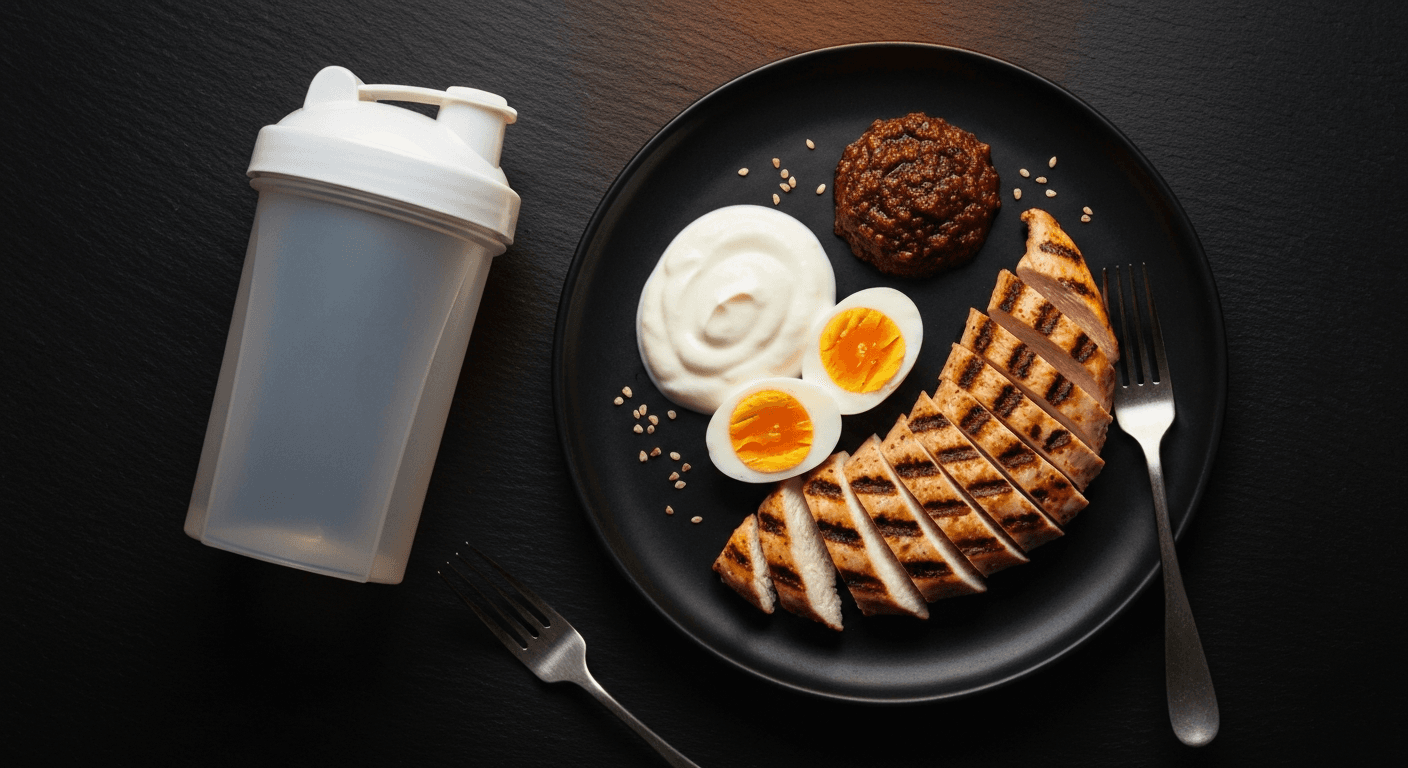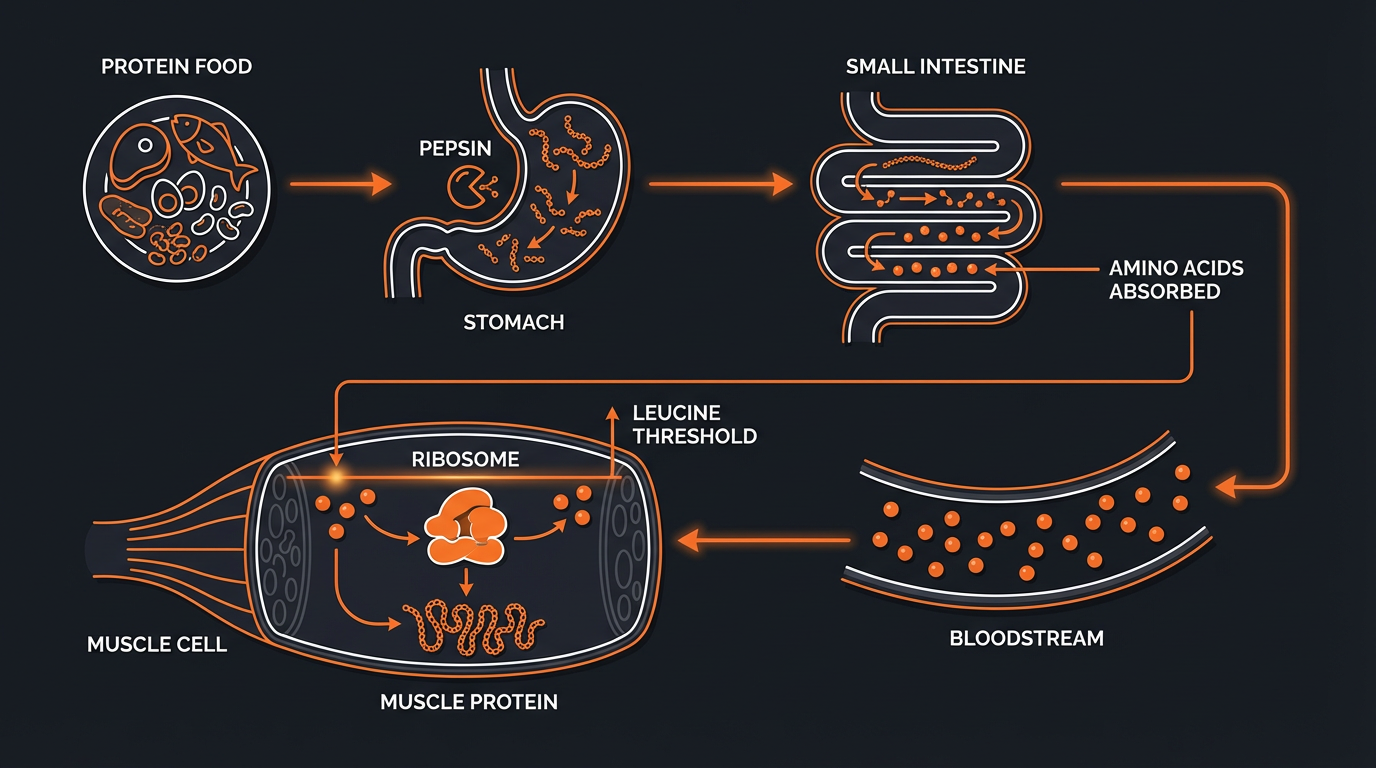Protein Powder vs. Whole Food Protein: Pros and Cons for Muscle Building
Read our comprehensive guide on protein powder vs. whole food protein: pros and cons for muscle building.

Key Takeaways
- Protein powder wins for convenience and speed, especially post-workout when you need protein fast.
- Whole foods give you way more vitamins, minerals, and fiber that powder can't match.
- You need 20-30 grams of quality protein per meal to maximize muscle protein synthesis regardless of the source.
- Powder costs more money but whole foods take more time to prep and cook.
- Mix both in your diet instead of picking one - use powder for convenience and whole foods for overall nutrition.
Get a Free AI Coach on WhatsApp
Ask questions, get workout plans, and track your progress — all from WhatsApp.
Message Your CoachWhen it comes to muscle building, choosing between protein powder and whole food protein can be a tricky decision. Each option has its own benefits and drawbacks. This article will break down the pros and cons of both, helping you make an informed choice to fuel your fitness journey.
Introduction to Protein Sources
Protein is essential for muscle growth and repair, and it’s crucial for anyone engaged in weightlifting or other physical activities. While protein powder offers convenience and a concentrated source of protein, whole food protein provides a range of additional nutrients. We’ll dive into the details to help you understand the main keyword, “Protein Powder vs. Whole Food Protein: Pros and Cons for Muscle Building.”

Pros and Cons of Protein Powder
Pros of Protein Powder
Protein powder is popular among athletes and bodybuilders for several reasons:
- •Convenience: Protein powder is quick and easy to prepare, making it perfect for people with busy lifestyles.
- •High Protein Content: It provides a concentrated source of protein. For instance, a typical serving of whey protein powder can contain about 20-25 grams of protein.
- •Variety: Different types of protein powders—such as whey, casein, and plant-based options—cater to various dietary needs and preferences.
Cons of Protein Powder
Despite its advantages, protein powder has some downsides:
- •Cost: High-quality protein powders can be expensive.
- •Processing: Most protein powders are highly processed and may contain additives, artificial sweeteners, and preservatives.
- •Nutrient Limitation: Unlike whole foods, protein powders lack the additional nutrients and fibers you get from natural sources.
Pros and Cons of Whole Food Protein
Pros of Whole Food Protein
Whole foods provide a more holistic approach to protein intake:
- •Nutrient-Dense: Whole foods such as meat, fish, beans, and legumes come packed with vitamins, minerals, and healthy fats.
- •Satiety: Eating whole foods can help you feel fuller for longer, assisting with appetite control.
- •Natural: Less processing means a more natural source of protein devoid of artificial additives.
Cons of Whole Food Protein
However, relying solely on whole foods for protein presents a few challenges:
- •Preparation Time: Whole foods generally require more prep time compared to the instant nature of protein powder.
- •Digestibility: Some individuals may find whole foods harder to digest, especially after intense workouts.
- •Variety and Taste: Some may find it difficult to maintain variety in their diet or might not enjoy the taste of protein-rich whole foods.
Which Is Better for Muscle Building?
The choice between protein powder and whole food protein ultimately depends on your individual needs and circumstances. According to a study published in the "Journal of Nutrition", consuming 20-30 grams of high-quality protein per meal can optimize muscle protein synthesis. This can be achieved with both protein powders and whole foods.
For those leading a hectic lifestyle or needing an immediate post-workout protein source, protein powder might be the best option. Conversely, individuals who prefer natural and nutrient-dense foods may find whole food protein more to their liking. Combining both can create a balanced diet to support muscle growth.
Conclusion: Finding the Right Balance
Both protein powder and whole food protein have their unique advantages and disadvantages. The key is to strike the right balance that suits your lifestyle, dietary preferences, and muscle-building goals. Consider incorporating a mix of both to enjoy the benefits of each. Experiment with different types to find out what works best for you, and always aim for a protein intake that aligns with your fitness objectives.
Frequently Asked Questions
- Is real food better than protein powder for building muscle?
- Whole food protein comes with extra nutrients, fiber, and keeps you fuller. But gram for gram, your muscles don't care whether the protein came from chicken or a shaker bottle. Whole foods should be your base with powder filling the gaps.
- How many protein shakes a day is too many?
- Try to get at least 60-70% of your protein from whole foods. One to two shakes per day is reasonable for most people. If you're drinking four shakes a day, you're probably missing out on nutrients you'd get from real meals.
- Can you build muscle with just protein powder?
- Technically your muscles would grow, but you'd miss out on vitamins, minerals, fiber, and other nutrients from whole foods. Plus, liquid protein doesn't keep you as full, so you'd likely end up overeating on other stuff. Use powder as a supplement, not a replacement.
- Why does chicken build more muscle than protein shakes?
- It doesn't, per gram of protein. But chicken comes with B vitamins, zinc, and iron that support recovery and hormone production. A mixed diet of whole foods plus convenient shakes when needed is the smart approach.